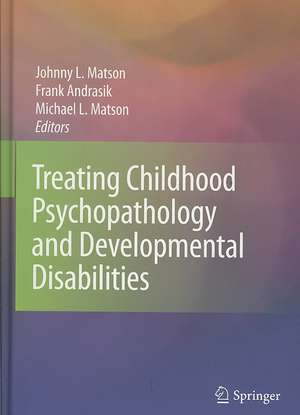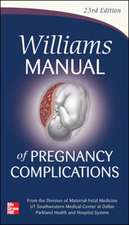Treating Childhood Psychopathology and Developmental Disabilities
Editat de Johnny L. Matson, Frank Andrasik, Michael L. Matsonen Limba Engleză Hardback – 3 dec 2008
Treating Childhood Psychopathology and Developmental Disabilities fills this need by summarizing and critiquing evidence-based treatment methods for pediatric patients from infancy through adolescence. After a concise history of evidence-based treatment, promising new trends, and legal/ethical issues involved in working with young people, well-known professors, practitioners, and researchers present the latest data in key areas of interest, including: (1) Cognitive-behavioral therapy and applied behavior analysis. (2) The effects of parenting in treatment outcomes. (3) Interventions for major childhood pathologies, including ADHD, PTSD, phobias, anxiety, depression, bipolar disorder, and conduct disorder. (4) Interventions for autistic spectrum disorders and self-injuring behaviors. (5) Techniques for improving communication, language, and literacy in children with developmental disabilities. (6) Treatments for feeding and eating disorders.
This comprehensive volume is an essential resource for the researcher’s library and the clinician’s desk as well as a dependable text for graduate and postgraduate courses in clinical child, developmental, and school psychology.
(A companion volume, Assessing Childhood Psychopathology and Developmental Disabilities, is also available.)
| Toate formatele și edițiile | Preț | Express |
|---|---|---|
| Paperback (1) | 794.36 lei 6-8 săpt. | |
| Springer – 13 oct 2010 | 794.36 lei 6-8 săpt. | |
| Hardback (1) | 1116.73 lei 6-8 săpt. | |
| Springer – 3 dec 2008 | 1116.73 lei 6-8 săpt. |
Preț: 1116.73 lei
Preț vechi: 1175.51 lei
-5% Nou
Puncte Express: 1675
Preț estimativ în valută:
213.68€ • 223.74$ • 177.24£
213.68€ • 223.74$ • 177.24£
Carte tipărită la comandă
Livrare economică 09-23 aprilie
Preluare comenzi: 021 569.72.76
Specificații
ISBN-13: 9780387095295
ISBN-10: 0387095292
Pagini: 457
Ilustrații: X, 457 p.
Dimensiuni: 193 x 260 x 25 mm
Greutate: 0.98 kg
Ediția:2009
Editura: Springer
Colecția Springer
Locul publicării:New York, NY, United States
ISBN-10: 0387095292
Pagini: 457
Ilustrații: X, 457 p.
Dimensiuni: 193 x 260 x 25 mm
Greutate: 0.98 kg
Ediția:2009
Editura: Springer
Colecția Springer
Locul publicării:New York, NY, United States
Public țintă
Professional/practitionerCuprins
History of Treatment In Children With Developmental Disabilities And Psychopathology.- Applied Behavior Analysis And The Treatment of Childhood Psychopathology And Developmental Disabilities.- Cognitive Behavior Therapy.- Parent-training Interventions.- Childhood Psychopathology and Developmental Disabilities.- Conduct Disorders.- Treatment of Attention-Deficit/Hyperactivity Disorder (ADHD).- PTSD, Anxiety, and Phobia.- Treatment Strategies for Depression in Youth.- Medication Treatment of Bipolar Disorder in Developmentally Disabled Children and Adolescents.- Treatment of Autism Spectrum Disorders.- Treatment of Self-injurious Behaviour in Children with Intellectual Disabilities.- Communication, Language, and Literacy Learning in Children with Developmental Disabilities.- Behavioral Medicine.- Eating Disorders.- Treatment of Pediatric Feeding Disorders.
Recenzii
From the reviews:
“Chapters begin with a clear statement about the importance of the topic, flowing smoothly to key issues, subtopics, and a wealth of research findings. … Psychologists who want to support their decisions scientifically, ethically and legally will find the information enormously valuable. The writing is smooth and easy to absorb with surprising consistency throughout considering the depth and breath of the contributors. The get to the point presentation makes the narrative interesting and comfortable to use as a reference.” (The Psychology Times, Vol. 2 (3), November, 2010)
“Chapters begin with a clear statement about the importance of the topic, flowing smoothly to key issues, subtopics, and a wealth of research findings. … Psychologists who want to support their decisions scientifically, ethically and legally will find the information enormously valuable. The writing is smooth and easy to absorb with surprising consistency throughout considering the depth and breath of the contributors. The get to the point presentation makes the narrative interesting and comfortable to use as a reference.” (The Psychology Times, Vol. 2 (3), November, 2010)
Notă biografică
Johnny L. Matson, Ph.D. is Professor and Distinguished Research Master and Director of Clinical Psychology in the Department of Psychology at Louisiana State University in Baton Rouge, LA. He is the author of 29 books and more than 350 scientific papers and book chapters. His area of clinical and research interests are developmental disabilities, autism, and severe child psychopathology.
Frank Andrasik, Ph.D. holds the positions of Professor of Psychology at the University of West Florida and Senior Research Scientist at the Florida Institute for Human and Machine Cognition. He has published approximately 200 articles and chapters and has delivered more than 450 talks on the topics of pain, stress, biofeedback, developmental disability, psychiatry, and organizational behavior management; he has also produced several texts for professionals. His most recent published texts are Biofeedback: A Practitioner’s Guide, 3rd edition (Guilford, $80), co-edited with Mark S. Schwartz in 2003, and Comprehensive Handbook of Personality and Psychopathology, Volume Two: Adult Psychopathology (Wiley, $200), an edited volume that has just been released (with a publication date of 2006). He belongs to a number of professional societies, holding the status of Fellow in the American Psychological Association (Division of Health Psychology and Society of Clinical Psychology), American Psychological Society, and Society of Behavioral Medicine, and serving as President of the Association for Applied Psychophysiology and Biofeedback in 1993-1994.
Michael L. Matson is a student at Louisiana State University. He is co-author of 2 books and 7 scientific papers. His research interests are in the area of developmental disabilities.
Frank Andrasik, Ph.D. holds the positions of Professor of Psychology at the University of West Florida and Senior Research Scientist at the Florida Institute for Human and Machine Cognition. He has published approximately 200 articles and chapters and has delivered more than 450 talks on the topics of pain, stress, biofeedback, developmental disability, psychiatry, and organizational behavior management; he has also produced several texts for professionals. His most recent published texts are Biofeedback: A Practitioner’s Guide, 3rd edition (Guilford, $80), co-edited with Mark S. Schwartz in 2003, and Comprehensive Handbook of Personality and Psychopathology, Volume Two: Adult Psychopathology (Wiley, $200), an edited volume that has just been released (with a publication date of 2006). He belongs to a number of professional societies, holding the status of Fellow in the American Psychological Association (Division of Health Psychology and Society of Clinical Psychology), American Psychological Society, and Society of Behavioral Medicine, and serving as President of the Association for Applied Psychophysiology and Biofeedback in 1993-1994.
Michael L. Matson is a student at Louisiana State University. He is co-author of 2 books and 7 scientific papers. His research interests are in the area of developmental disabilities.
Textul de pe ultima copertă
Child psychology is a constantly expanding field, with dozens of specialized journals devoted to major disorders springing up in recent years. With so much information available – and the prospect of overload inevitable – researchers and clinicians alike need to navigate the knowledge base with as much confidence as they do the nuances of diagnosis and their young clients’ complex social, emotional, and developmental worlds.
Treating Childhood Psychopathology and Developmental Disabilities fills this need by summarizing and critiquing evidence-based treatment methods for pediatric patients from infancy through adolescence. After a concise history of evidence-based treatment, promising new trends, and legal/ethical issues involved in working with young people, well-known professors, practitioners, and researchers present the latest data in key areas of interest, including:
(A companion volume, Assessing Childhood Psychopathology and Developmental Disabilities, is also available.)
Treating Childhood Psychopathology and Developmental Disabilities fills this need by summarizing and critiquing evidence-based treatment methods for pediatric patients from infancy through adolescence. After a concise history of evidence-based treatment, promising new trends, and legal/ethical issues involved in working with young people, well-known professors, practitioners, and researchers present the latest data in key areas of interest, including:
- Cognitive-behavioral therapy and applied behavior analysis.
- The effects of parenting in treatment outcomes.
- Interventions for major childhood pathologies, including ADHD, PTSD, phobias, anxiety, depression, bipolar disorder, and conduct disorder.
- Interventions for autistic spectrum disorders and self-injuring behaviors.
- Techniques for improving communication, language, and literacy in children with developmental disabilities.
- Treatments for feeding and eating disorders.
(A companion volume, Assessing Childhood Psychopathology and Developmental Disabilities, is also available.)
Caracteristici
Provides a wide range of evidence-based treatments in an immediately useful presentation from infancy through adolescence Explores interventions for significant childhood pathologies, developmental disabilities, and behavioral medicine Examines emerging trends, new technologies, and treatment issues Discusses the effects of parenting in treatment outcomes Examines techniques for improving communication, language, and literacy in children with developmental disabilities Provides a critical analysis of the strengths and weaknesses of current assessment tools and techniques as well as future trends Companion volume focuses on empirically based treatments Includes supplementary material: sn.pub/extras











